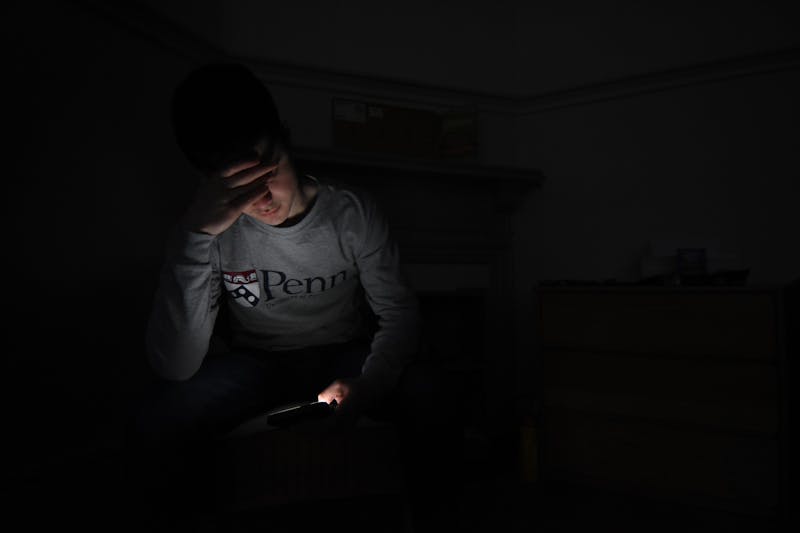
You got in! Time to wonder why for the next four years.
As I prepared to enter a rigorous academic scene, I was swarmed with warnings of imposter syndrome — a condition with which Penn students are all too familiar. It’s the unsettling feeling you get after listening to your classmate's summer passion project and suddenly thinking admissions made a mistake with you. It’s the eerie sensation that washes over you as your peers beam over their quiz grades. Being stranded in a sea of overachievers who are exactly like — or better than — you can make it feel like you’re drowning.
Despite earning a seat at one of the most prestigious universities in the world, many of us can't conceptualize our admission. We feel like imposters hidden behind a mask of success. Yes, this includes the girl in your writing seminar who founded a small business, released a novel, and walked in New York Fashion Week.
The truth is, imposter syndrome is not indicative of weakness, failure, or defect. In fact, it can be used to make you a better student, a better learner, and a better person.
When I opened Penn’s admissions portal to see red and blue streamers flowing down my screen, I wondered how such an advanced system could accidentally accept the wrong student. I scoured Reddit threads and LinkedIn profiles looking at the accomplishments that got other students into Penn. I did not cure a small infectious disease. I did not create a startup. All of the hours I’d spent in academic pursuit felt meaningless.
I checked my inbox daily, waiting for the other shoe to drop: an email with the subject, “Sorry, we made a mistake.” I didn’t allow myself to express any anxieties or criticisms about Penn for fear the universe would somehow rescind my admission. I knew that Penn was the best. I knew that Penn could do nothing wrong, and I especially knew that I didn’t belong there. My imposter syndrome was in full swing.
Getting into Penn feels like you’ve won the Hunger Games. But when you arrive here, you realize the games haven’t even started yet. You are lost in a haze of club applications, coffee chats, and a race for internships. Conversations turn into disguised competitions between who has the most intense chemistry class or who spent the most hours in Van Pelt-Dietrich Library. Trying to meet friends becomes a game of surface-level networking. Balancing a social life and homework feels like holding plates while riding a unicycle. Penn students manage to do all of this while maintaining the image of perfection, so much so that it even has a name: “Penn Face.”
We naturally want to prove ourselves to everyone, but by demonstrating our competence, we lose the true purpose of what being at Penn should be.
Through all of this, I’ve come to a radical realization. What if instead of constantly trying to prove that we are smart and that we deserve to be at Penn, we enter every room assuming we are the least intelligent person there?
This does not mean fueling self deprecation, but instead embracing that there is much we do not know and that we can learn from those around us. We can absorb the information our diverse peers give rather than gauge if they have the intelligence for us to listen. Learning from our classmates instead of competing with them fosters collaborative intellectual growth. Practice intellectual humility. Ask questions, and don’t fear saying the wrong thing, because either way, we leave class having learned something.
It’s extremely liberating to admit we know practically nothing.
During one of my first classes at Penn, it became clear how intelligent our peers really are. My classmates and I started a discussion about our assigned reading. Their perceptive interpretations of the book were cause for an imposter syndrome spiral. This time, though, I forced myself to observe the way each of them articulated their mindset, and by the next reading, I implemented their lenses. By leaning into my academic insecurity, I became a stronger student.
Embracing our imposter syndrome seems easier said than done. It may feel unintuitive, but it can be a catalyst for your growth. Succeeding at Penn does not have to be a prestigious consulting job or entrance into a top 20 graduate school. Succeeding also looks like growing as a person and learning from the generation of incredibly bright people that surround us. If that means believing you are the dumbest person in the room, I think it’s worth it.
PIPER SLINKA-PETKA is a College first year studying health and societies from West Virginia. Her email address is pipersp@sas.upenn.edu.
The Daily Pennsylvanian is an independent, student-run newspaper. Please consider making a donation to support the coverage that shapes the University. Your generosity ensures a future of strong journalism at Penn.
Donate












